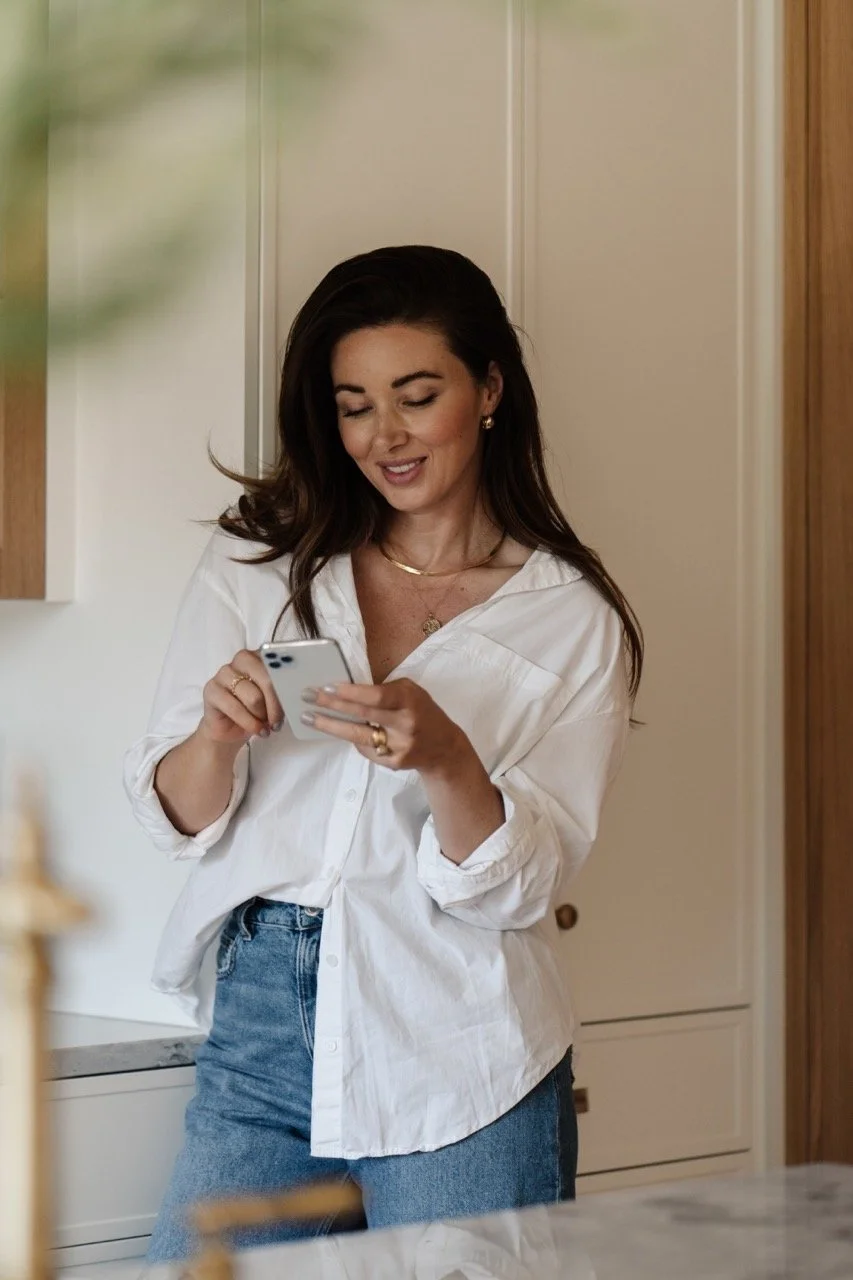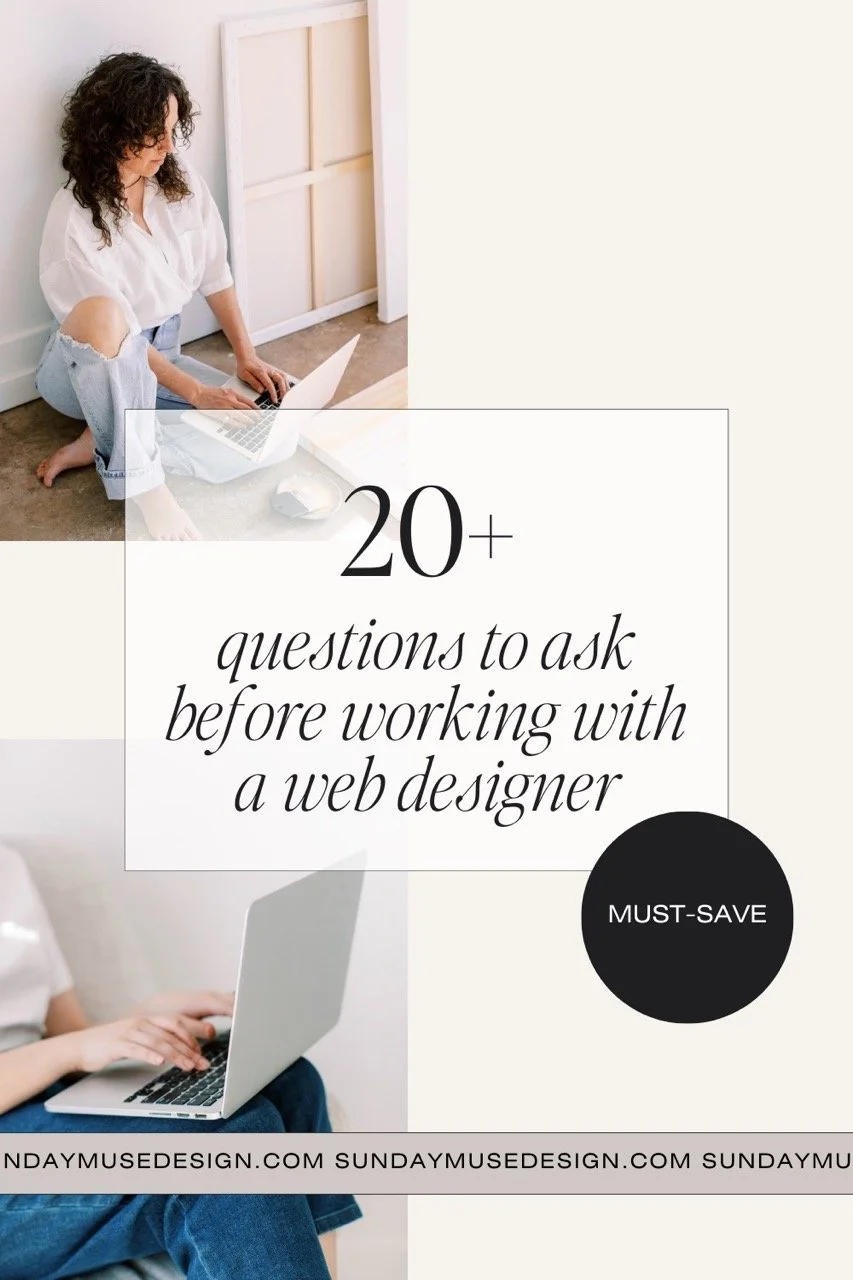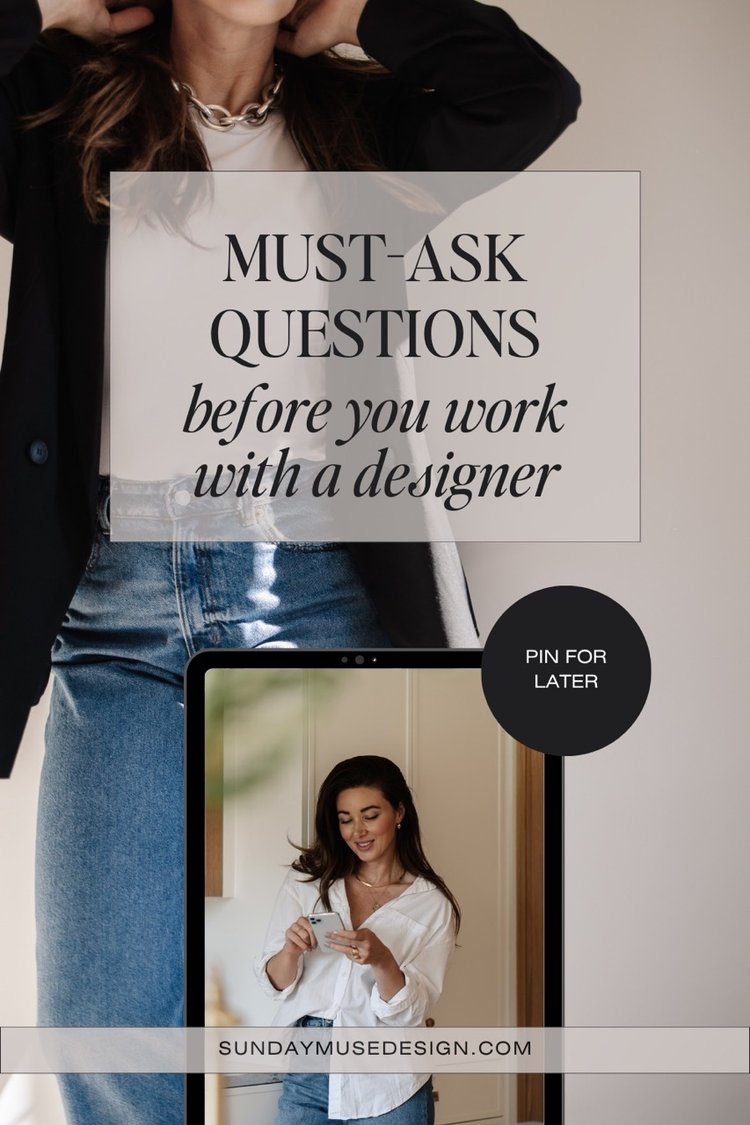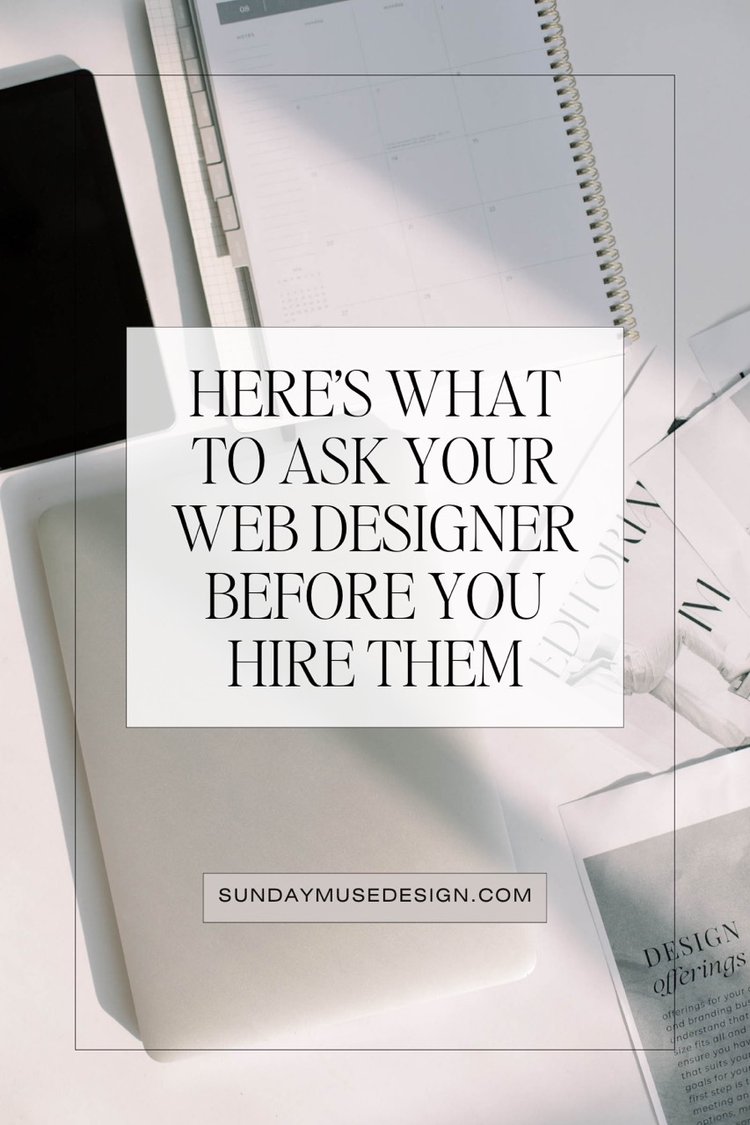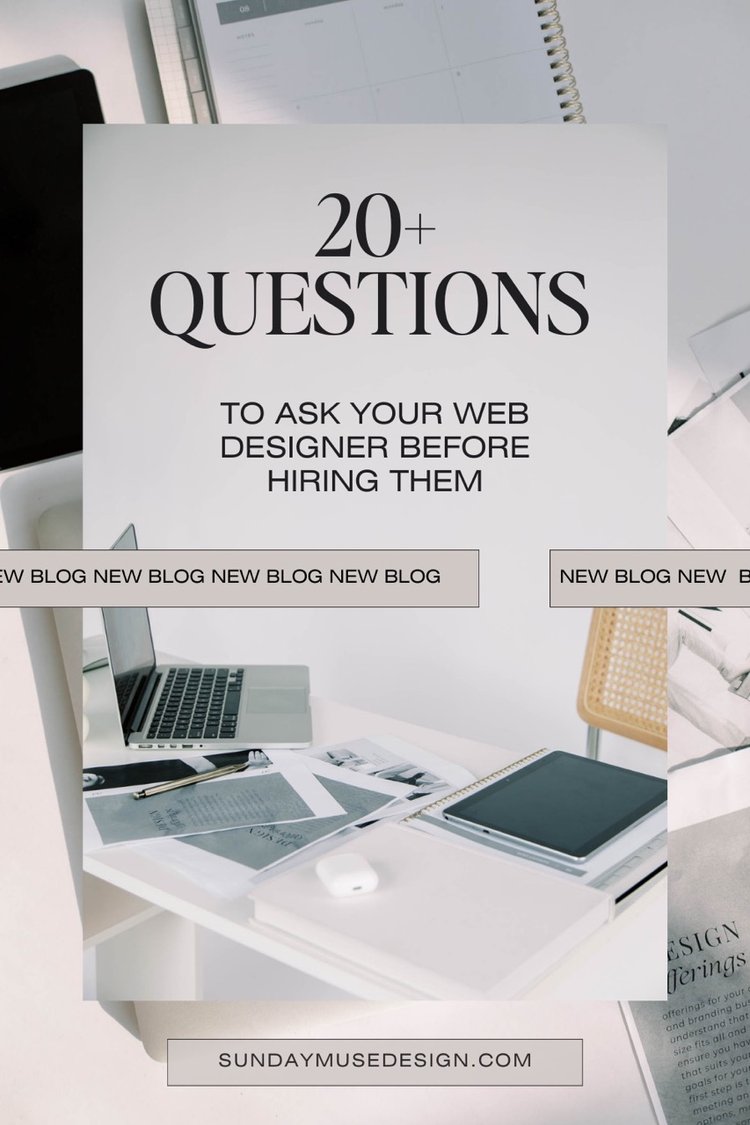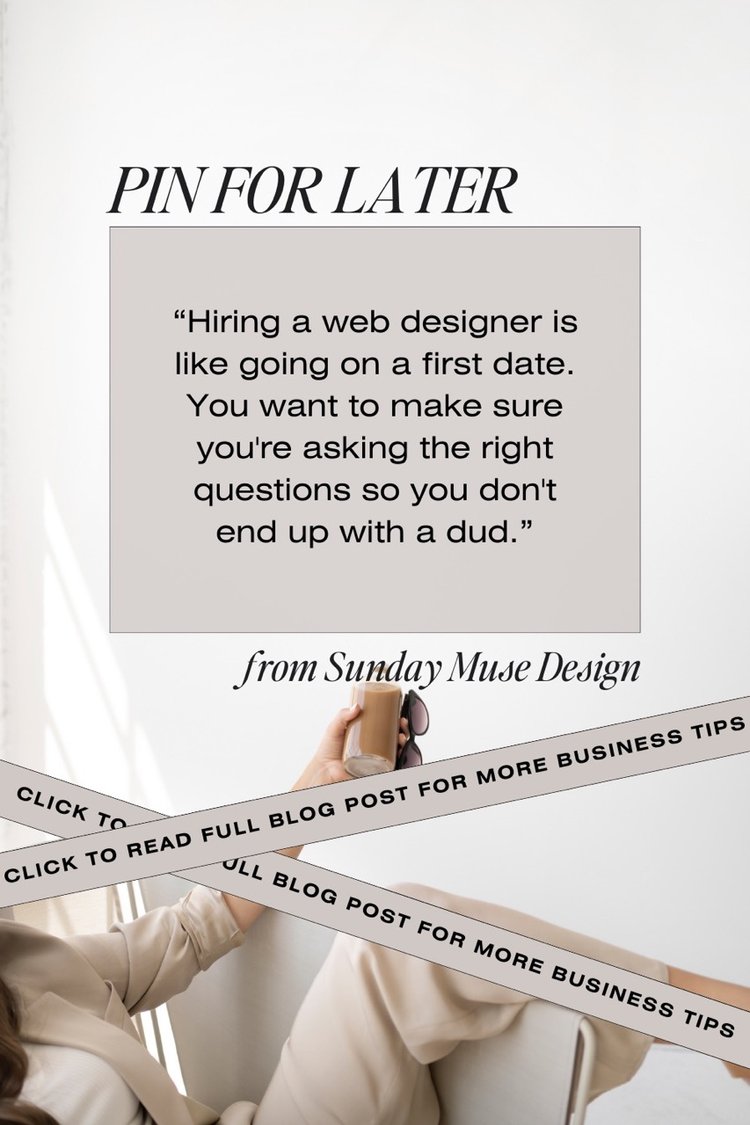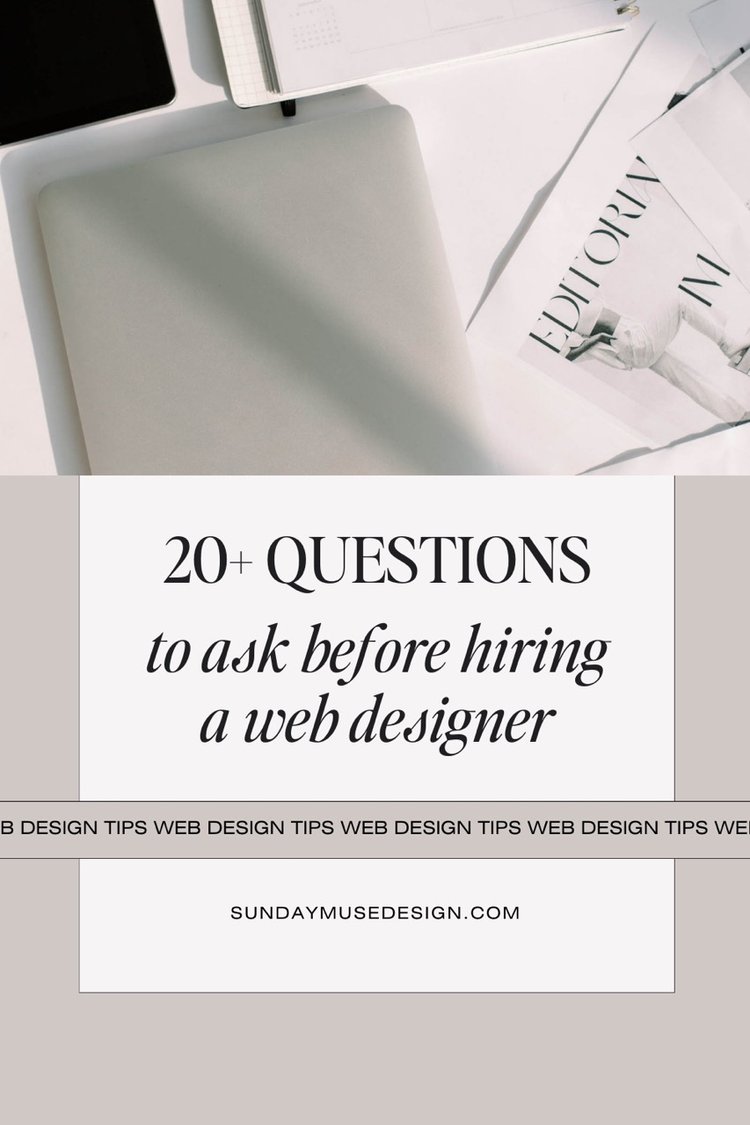21 Questions to Ask Your Web Designer Before Working with Them
Starting a new website project? Hold up, champ! Hiring a web designer is like going on a first date. You want to make sure you're asking the right questions so you don't end up with a dud. 😉 Choosing the right web designer is key to ensuring your website meets your goals and expectations. So I want to give you ten essential questions to ask your website designer before starting a project.
From understanding their experience and expertise to knowing their process and timeline, these questions will help you gather all the necessary information for a successful website project. By asking about their portfolio, you can get a sense of their style and capabilities. Inquiring about their experience with your industry or niche will ensure they can create a website that resonates with your target audience.
Additionally, you'll want to discuss the project timeline and budget to ensure everything aligns with your expectations. By asking about their design process and how they handle revisions, you can gain insight into their working style and ensure that you are comfortable with their approach.
So….before jumping into a web design project, make sure you have all the information you need. Here are 20+ must-ask questions to fire up your website project:
Questions to Ask a Web Designer
Get crystal clear on your website goals and objectives
Before diving into the technical aspects of the web design project, it's important to ensure that your goals and objectives are clear. By discussing these with your web designer, you can align your expectations and set the project up for success.
First, make sure YOU understand the primary goals of your website. Whether it’s generating leads, increasing sales, or building brand awareness, your web designer needs to understand what you want to achieve so they can tailor the design and functionality of your website to best support your goals.
Then, ask:
How will you ensure the website reflects my brand? Your website should be a reflection of your brand identity. Ask your web designer how they plan to incorporate your brand elements, such as logo, color scheme, and typography, into the design. Discuss the overall look and feel you want to achieve to ensure the website aligns with your brand image.
What features and functionality will be included in the website? Discuss the specific features and functionality you envision for your website. Whether it's e-commerce capabilities, a blog, or a contact form, make sure your web designer can accommodate your needs. Ask about any limitations or additional costs associated with certain features to avoid surprises down the line.
Assess the web designer's experience and portfolio
To ensure you're working with a capable web designer, it's important to assess their experience and review their portfolio. This will give you a better sense of their abilities and help you determine if they are the right fit for your project.
What is your experience with web design? It's important to understand the web designer's level of experience. Ask about their background, how long they have been in the industry, and if they have worked on similar projects before. This will help you gauge their expertise and determine if they have the necessary skills to meet your specific requirements.
Can you provide examples of your previous work? Requesting a portfolio of their past projects allows you to assess the web designer's style and capabilities. Look for websites that align with your vision and objectives. Pay attention to the overall design, user experience, and functionality. This will give you a better understanding of what they can deliver for your project. You can also look at their portfolios (check their website and social media accounts!) before you hop on a call together.
Have you worked with clients in my industry or niche before? While this isn’t REQUIRED, having experience in your industry or niche can be beneficial. A web designer who understands your target audience and industry dynamics will be better equipped to create a website that resonates with your visitors. They will have a better understanding of the features and design elements that work well within your industry.
Clarify the web design process and timeline
Once you have a clear understanding of the web designer's experience and capabilities, it's time to dive deeper into the specifics of the web design process and timeline. This will help you ensure that you and the web designer are aligned on the necessary steps and expectations.
What is your design process? Understanding the web designer's process is crucial for a smooth collaboration. Ask about their approach to gathering content, creating wireframes or mockups, and obtaining your feedback. A well-defined design process will ensure that your vision is understood and that communication flows effectively throughout the project.
How do you handle design revisions? It's common for design revisions to be necessary during the web design process. Ask about the web designer's policy regarding revisions. Will they charge additional fees for excessive changes, or is a certain number of revisions included in the project scope? Clarify how the revision process will be managed to avoid any misunderstandings or unexpected costs.
What is your estimated timeline for completing the website? Understanding the timeline for your website project is essential for planning purposes. Ask the web designer for an estimated timeline, including milestones and deliverables. This will help you manage your expectations and ensure that the project stays on track.
Discuss SEO considerations and optimization
Search engine optimization (SEO) is essential for driving traffic to your website. Therefore, it's vital to ensure that your website is optimized for search engines. And listen—I can’t tell you the number of clients who’ve worked with another designer who promised them basic SEO set-up… and when I go behind the curtain to check things out, nothing was actually done. Oof. So… I’m pretty passionate about this part. ASK ABOUT SEO.
Ask your web designer about their approach to SEO. Do they have experience with SEO, and how do they incorporate it into their design process? What steps do they take to ensure that your website is search engine friendly?
Inquire about their approach to keyword research and on-page optimization. Do they research the keywords relevant to your business? How do they optimize your website's content and structure for search engines?
What other SEO considerations and optimization will be implemented? Ask about their knowledge of SEO best practices, including optimizing page load speed, meta tags, and site structure. A well-optimized website will have a better chance of ranking well in search engine results.
Discuss their approach to tracking and analyzing the website's performance. Do they use tools like Google Analytics to track the site's traffic and performance? How do they use this data to make improvements to the site's SEO?
Ensure responsiveness and mobile-friendly design
It’s 2023 (almost 2024). Most people are accessing websites using their mobile devices. Therefore, it's critical to ensure that your website is mobile-friendly and responsive. A responsive website adjusts its layout and content based on the device's screen size, ensuring that the user has an optimal browsing experience.
Ask your web designer about their approach to mobile design. Do they use responsive design, or do they create a separate mobile site? Are there any additional costs for mobile optimization?
It's also crucial to discuss the website's loading speed. A slow-loading website can negatively impact the user experience and result in a high bounce rate. Inquire about the measures the designer takes to ensure that the website loads quickly.
Ask about their approach to testing the website's responsiveness and mobile-friendliness. Do they use tools to test the site's performance on different devices and browsers? Which browsers do they check responsiveness on? (There are literally hundreds of browsers… they can’t check them all… but they should at least check the biggest 1-3.)
Ask about post-launch support and training
Launching a website is just the beginning. Maintaining and updating it is an ongoing process. Your website is like a living, breathing organism. It’s supposed to evolve with your brand, but it doesn’t do that automatically. You have to manually update it and maintain it. So it’s a GREAT idea to discuss post-launch support and training with your web designer.
Ask your web designer about their approach to post-launch support. What kind of support do they offer, and for how long? Do they offer website maintenance services, and if so, what is included? Clarify the level of support and any associated costs to avoid any surprises in the future.
It's also crucial to discuss training. Will they provide training on how to update the website's content and make changes? How long will the training last, and what kind of support will they offer after the training?
Determine the cost and payment terms
The cost of a website design project can vary significantly, depending on the designer's experience, the complexity of the project, and the features you want on your website. Hiring a web designer is an investment. It’s important to get a detailed breakdown of the project costs before kicking things off.
Ask your web designer about their pricing structure. Do they charge an hourly rate or a fixed fee? What is included in the cost? Will there be additional charges for revisions or changes?
What other costs should you expect? Does your designer purchase any font licenses for you, or is that your responsibility? Is your domain host cost included?
Discuss the payment terms. How much should you pay upfront? When are the remaining payments due?
Ask about their refund policy. What happens if you are not satisfied with the work? Do they offer refunds, and if so, what are the conditions?
Finding the right web designer for your project is the foundation of the success of your website. By asking these essential questions, you can gain valuable insights into their expertise, working style, and overall fit for your project. Remember to take the time to discuss your goals and objectives, review their portfolio, clarify the design process and timeline, and address important considerations such as responsiveness, SEO, and ongoing support.
And if you’re finding yourself ready to talk to a website designer, my inbox is open! Hello@sundaymusedesign.com

